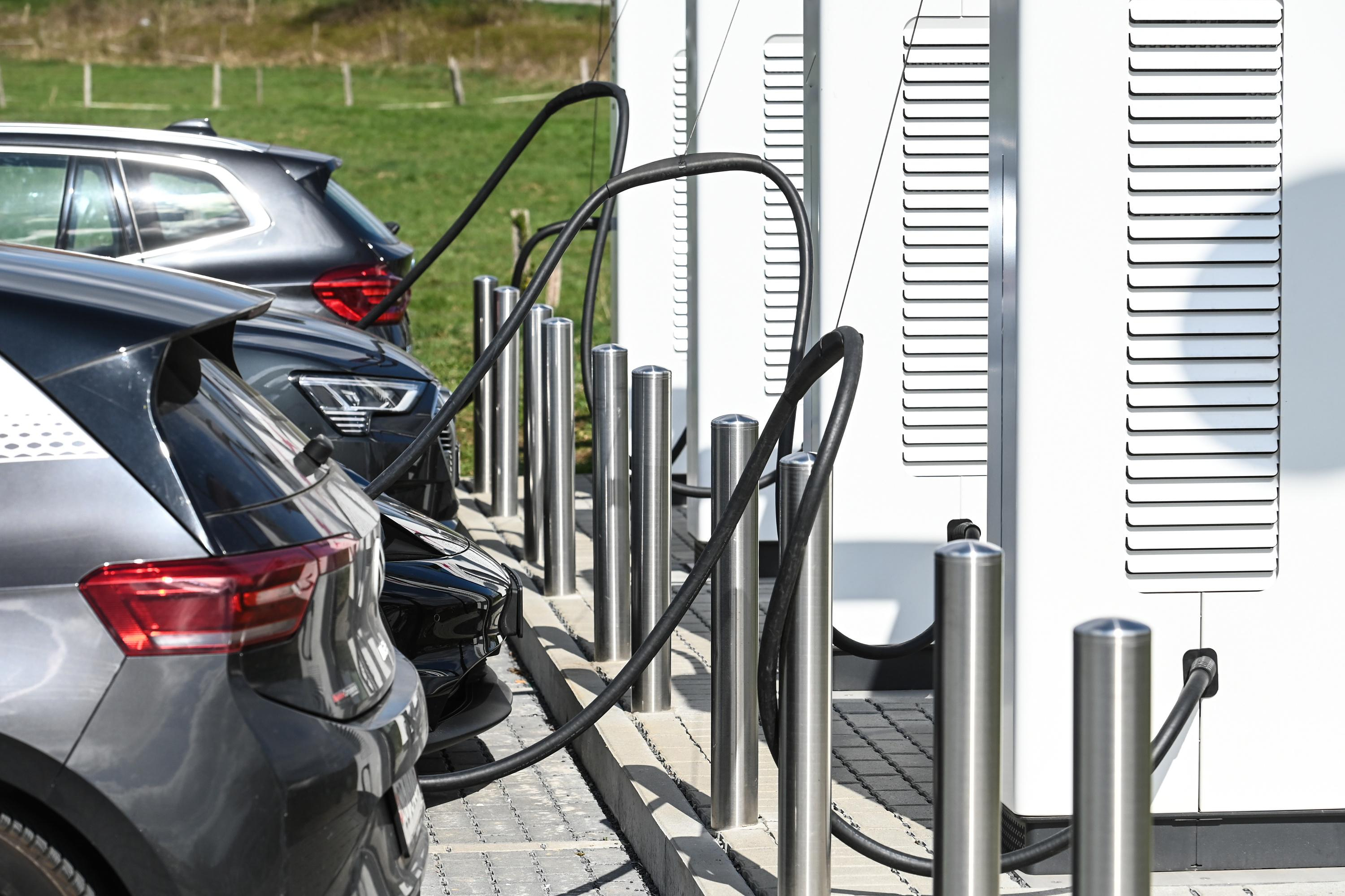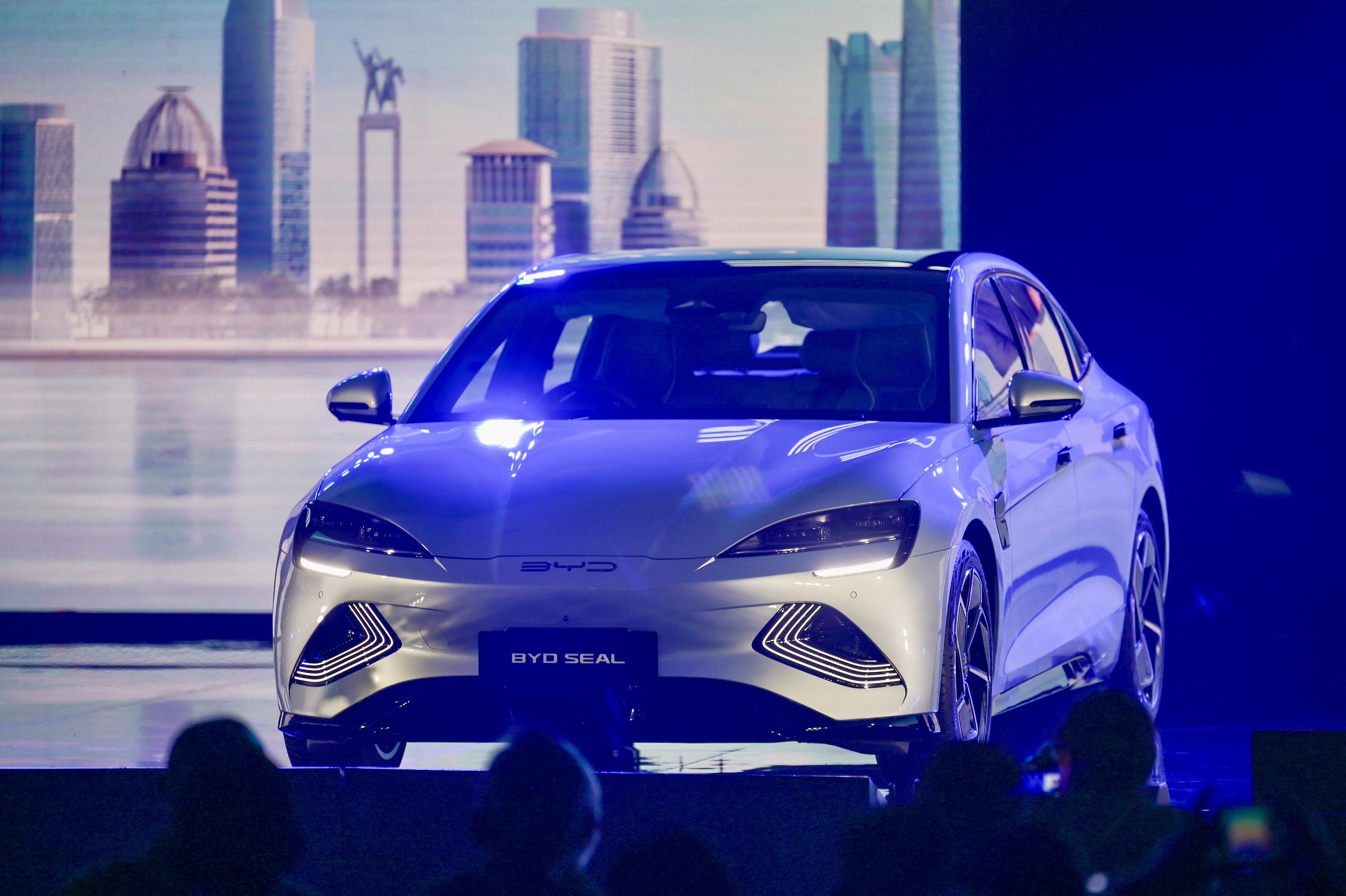Revolution in an ultra-conservative industry: The Uber operator Thomas Mohnke, together with other taxi and rental car companies, is starting the dawn of a new era. Nationwide, companies want to convert around 3,000 vehicles to a CO₂-neutral drive. "We are willing to make advance payments and hope that we can use this to convince the industry," says the Berlin entrepreneur. "We also need political support for this."
As general contractor, Mohnke organizes the Uber service in Germany. In addition to the drivers of his company Safedriver, thousands of employees from other rental car companies are on the road for the Californian mobility provider under his direction. Mohnke has just ordered 200 hydrogen vehicles for its own operations, 70 of which are already on the road. The advantage of the car is that it can be refueled quickly, he says.
Electric cars with batteries are also suitable for two-shift operation - provided they can be charged at fast charging stations. With the exception of a few S-Classes from Mercedes-Benz, his fleet of around 500 vehicles already consists exclusively of electric cars, says Mohnke.
In Berlin, he loads them onto pillars on his own company premises at Anhalter Bahnhof. This makes his company Safedriver an exception in the industry. The taxi fleet in Germany in particular is still mainly on the road with petrol and diesel engines.
Mohnke knows the business better than almost anyone else. The 65-year-old from Berlin bought his first taxi as a student at the age of 20. In the 1990s he built up one of Berlin's largest taxi services. He was the operator of the Bundestag transport service and drives his limousines for almost all federal ministries.
Working with Uber has brought Mohnke a lot of trouble; For a long time, politicians and the taxi lobby have been fighting hard against the liberalization of passenger transport in Germany. Nevertheless, the entrepreneur wants to push his industry to the next modernization.
Taxis and rental cars should move away from combustion engines as quickly as possible, i.e. become electric. It's about almost 100,000 cars in the country, which cover millions of kilometers a year, especially in the cities, blowing a lot of CO2 into the air. And it's about a completely fragmented industry with more than 32,000 individual entrepreneurs, as figures from the Federal Ministry of Transport show.
In order to make the transition easier for their competitors, the entrepreneurs behind the “Green Mobility? Yes, please” give away electricity. Safedriver operates four fast-charging stations centrally near Potsdamer Platz. "We promise every taxi driver who switches to electromobility that he can charge there for free for a year," says Mohnke.
The drive for the entrepreneurs behind the campaign is not only climate and environmental protection, they are also concerned with securing their own business. Because the days of diesel taxis in the city center are coming to an end faster than many in the industry previously thought.
The city council of Munich has just decided to ban diesel vehicles of emission classes Euro 5 and older from October 1, 2023 in the city center and the Mittlerer Ring. There is still a transitional regulation for taxis, but from April 2024 they will also be over. The fact that metropolises will eventually ban internal combustion engines completely from the city center is already being discussed. By then at the latest, taxi and rental car providers will no longer have an alternative to converting their fleets.
It is better, therefore, to prepare for it beforehand – and use the support from politicians. The entrepreneurs of the initiative complain, however, that this is going back. The traffic light coalition has extended subsidies for electric cars. However, payments to commercial fleet operators are scheduled to end on September 1, 2023. "We still need the support of the environmental bonus," demands Mohnke and calculates that 100,000 new electric cars will cost around four billion euros.
He also proposes a few measures that favor e-cars in the fleet, but do not cost the state any money. Munich and Hamburg airports have already implemented one of these steps: In the taxi queue there are one or two spaces at the very front where only electric taxis are allowed to drive. You can then drive past all the other cars in the waiting area and pick up passengers more quickly.
In Munich last summer, this caused trouble among the taxi drivers who felt disadvantaged. The protest confirms Mohnke's judgments about his own taxi industry: he considers it to be rigid and hostile to innovation. In the '90s he sold his taxi company in Berlin, which at one point had 660 cars, because he couldn't take it, he says, at the time the drivers fought against the radio in the car - and wanted to hold on to the speakerphones.
Today, he and his colleagues believe the conditions are better, because around a sixth of the companies now drive taxis as well as Uber and similar providers - officially rental cars with a driver. The initiative also wants to make things easier for these providers and is now arguing with environmental reasons.
Electric rental cars should be allowed to use the bus lanes with passengers like taxis, and Mohnke also wants to discuss the old controversial issue of the obligation to return as part of his e-offensive. So far, rental car drivers like those from Uber have been obliged to return to the company premises after a tour. "This alone means that a million kilometers are unnecessarily covered every day in Germany," complains Mohnke. At least for e-cars, the regulation should be lifted, he demands.
It is questionable whether he will find the Federal Transport Minister Volker Wissing (FDP) willing to listen. The coalition agreement states in very general terms that “digital mobility services, innovative mobility solutions and car sharing … will be supported”. As a minister, Wissing has not yet spoken about a reform of the Passenger Transport Act.
"Everything on shares" is the daily stock exchange shot from the WELT business editorial team. Every morning from 7 a.m. with our financial journalists. For stock market experts and beginners. Subscribe to the podcast on Spotify, Apple Podcast, Amazon Music and Deezer. Or directly via RSS feed.

 Germany: the trial of an AfD leader, accused of chanting a Nazi slogan, resumes this Tuesday
Germany: the trial of an AfD leader, accused of chanting a Nazi slogan, resumes this Tuesday New York: at Columbia University, the anti-Semitic drift of pro-Palestinian demonstrations
New York: at Columbia University, the anti-Semitic drift of pro-Palestinian demonstrations What is Akila, the mission in which the Charles de Gaulle is participating under NATO command?
What is Akila, the mission in which the Charles de Gaulle is participating under NATO command? Lawyer, banker, teacher: who are the 12 members of the jury in Donald Trump's trial?
Lawyer, banker, teacher: who are the 12 members of the jury in Donald Trump's trial? What High Blood Pressure Does to Your Body (And Why It Should Be Treated)
What High Blood Pressure Does to Your Body (And Why It Should Be Treated) Vaccination in France has progressed in 2023, rejoices Public Health France
Vaccination in France has progressed in 2023, rejoices Public Health France Food additives suspected of promoting cardiovascular diseases
Food additives suspected of promoting cardiovascular diseases “Even morphine doesn’t work”: Léane, 17, victim of the adverse effects of an antibiotic
“Even morphine doesn’t work”: Léane, 17, victim of the adverse effects of an antibiotic Orthodox bishop stabbed in Sydney: Elon Musk opposes Australian injunction to remove videos on X
Orthodox bishop stabbed in Sydney: Elon Musk opposes Australian injunction to remove videos on X One in three facial sunscreens does not protect enough, warns L'Ufc-Que Choisir
One in three facial sunscreens does not protect enough, warns L'Ufc-Que Choisir What will become of the 81 employees of Systovi, a French manufacturer of solar panels victim of “Chinese dumping”?
What will become of the 81 employees of Systovi, a French manufacturer of solar panels victim of “Chinese dumping”? “I could lose up to 5,000 euros per month”: influencers are alarmed by a possible ban on TikTok in the United States
“I could lose up to 5,000 euros per month”: influencers are alarmed by a possible ban on TikTok in the United States Dance, Audrey Hepburn’s secret dream
Dance, Audrey Hepburn’s secret dream The series adaptation of One Hundred Years of Solitude promises to be faithful to the novel by Gabriel Garcia Marquez
The series adaptation of One Hundred Years of Solitude promises to be faithful to the novel by Gabriel Garcia Marquez Racism in France: comedian Ahmed Sylla apologizes for “having minimized this problem”
Racism in France: comedian Ahmed Sylla apologizes for “having minimized this problem” Mohammad Rasoulof and Michel Hazanavicius in competition at the Cannes Film Festival
Mohammad Rasoulof and Michel Hazanavicius in competition at the Cannes Film Festival Skoda Kodiaq 2024: a 'beast' plug-in hybrid SUV
Skoda Kodiaq 2024: a 'beast' plug-in hybrid SUV Tesla launches a new Model Y with 600 km of autonomy at a "more accessible price"
Tesla launches a new Model Y with 600 km of autonomy at a "more accessible price" The 10 best-selling cars in March 2024 in Spain: sales fall due to Easter
The 10 best-selling cars in March 2024 in Spain: sales fall due to Easter A private jet company buys more than 100 flying cars
A private jet company buys more than 100 flying cars This is how housing prices have changed in Spain in the last decade
This is how housing prices have changed in Spain in the last decade The home mortgage firm drops 10% in January and interest soars to 3.46%
The home mortgage firm drops 10% in January and interest soars to 3.46% The jewel of the Rocío de Nagüeles urbanization: a dream villa in Marbella
The jewel of the Rocío de Nagüeles urbanization: a dream villa in Marbella Rental prices grow by 7.3% in February: where does it go up and where does it go down?
Rental prices grow by 7.3% in February: where does it go up and where does it go down? Europeans: “All those who claim that we don’t need Europe are liars”, criticizes Bayrou
Europeans: “All those who claim that we don’t need Europe are liars”, criticizes Bayrou With the promise of a “real burst of authority”, Gabriel Attal provokes the ire of the opposition
With the promise of a “real burst of authority”, Gabriel Attal provokes the ire of the opposition Europeans: the schedule of debates to follow between now and June 9
Europeans: the schedule of debates to follow between now and June 9 Europeans: “In France, there is a left and there is a right,” assures Bellamy
Europeans: “In France, there is a left and there is a right,” assures Bellamy These French cities that will boycott the World Cup in Qatar
These French cities that will boycott the World Cup in Qatar Serie A: Bologna surprises AS Rome in the race for the C1
Serie A: Bologna surprises AS Rome in the race for the C1 Serie A: Marcus Thuram king of Italy, end of the debate for the position of number 9 with the Blues?
Serie A: Marcus Thuram king of Italy, end of the debate for the position of number 9 with the Blues? Milan AC-Inter Milan: Thuram and Pavard impeccable, Hernandez helpless… The tops and flops of the derby
Milan AC-Inter Milan: Thuram and Pavard impeccable, Hernandez helpless… The tops and flops of the derby Ligue 2: Auxerre leader, Bordeaux in crisis, play-offs... 5 questions about an exciting end of the season
Ligue 2: Auxerre leader, Bordeaux in crisis, play-offs... 5 questions about an exciting end of the season


















